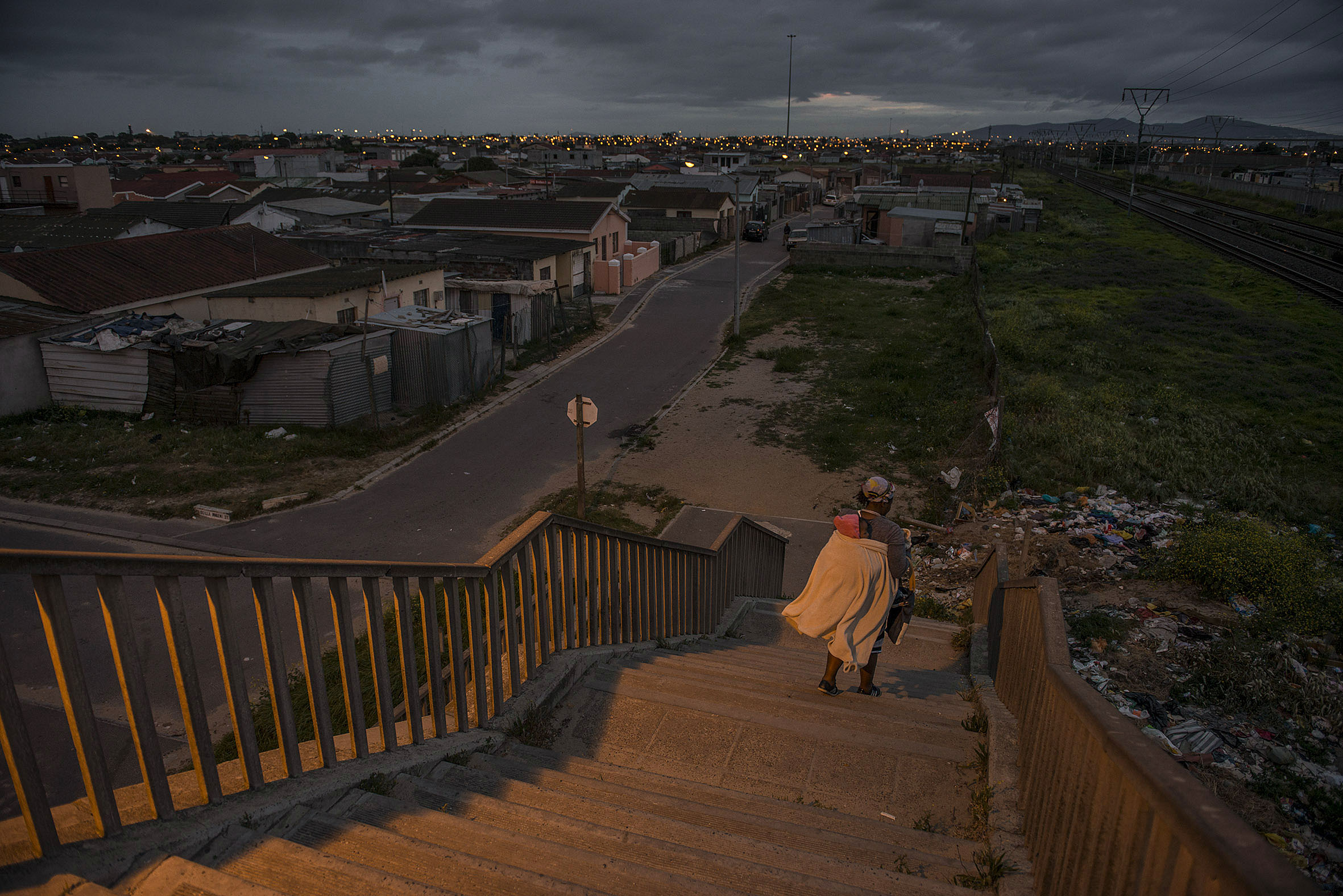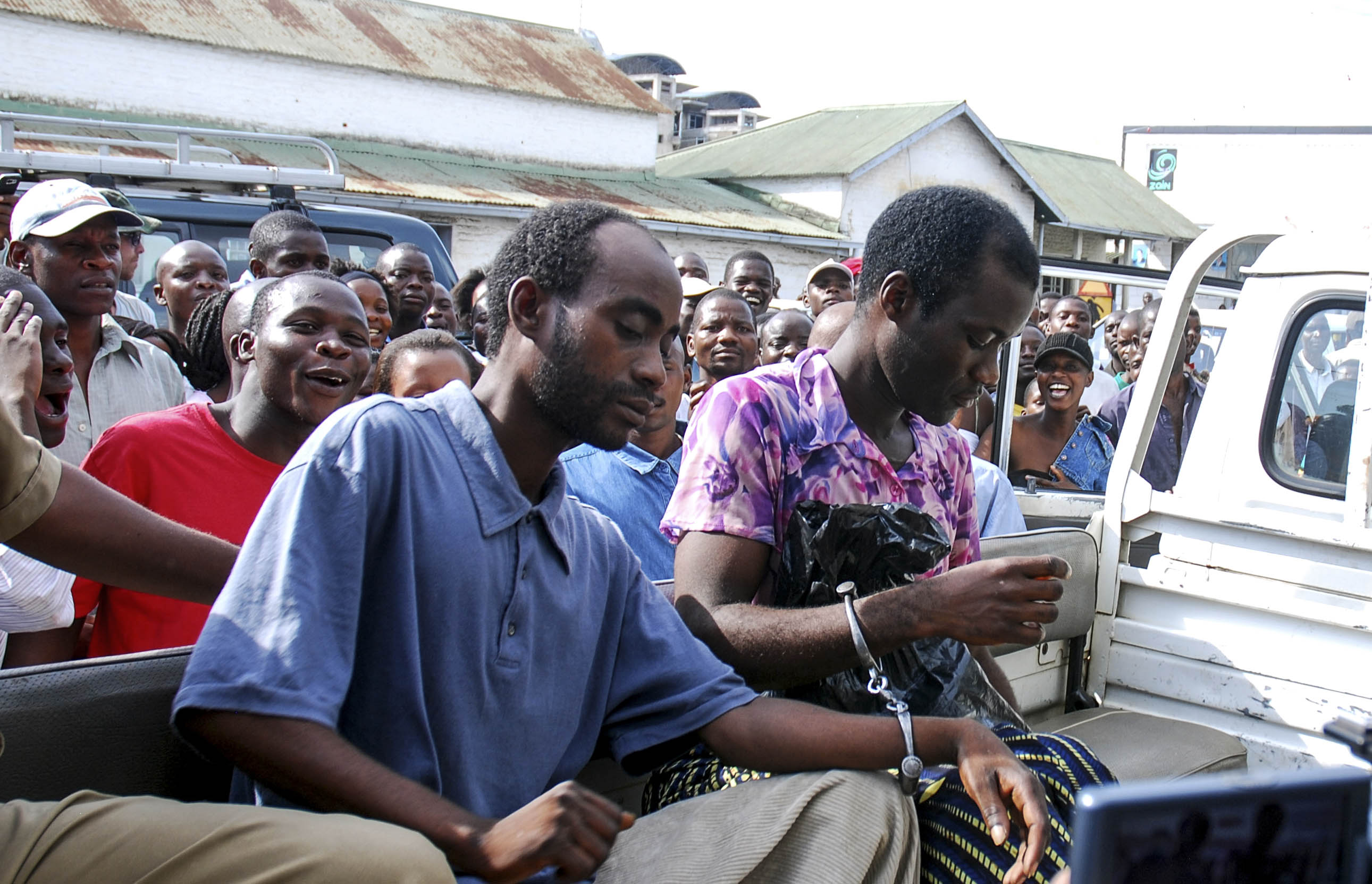New start: Tiwonge Chimbalanga now lives in Tambo Village near Manenberg. She loves being in South Africa but life is still difficult for LGBTI people living in Malawi.
As we sit outside her one-bedroom shack in the Cape Flats township of Tambo Village, passers-by greet Tiwonge Chimbalanga warmly — alternating between “skwiza”, “aunty” and, more commonly, “Aunty Titi”.
“That’s what they call me. Not ‘Aunty Tiwonge’, no. They call me ‘Aunty Titi’. It’s a shortcut. I’m famous, mos,” she laughs.

[Tambo Village near Manenberg. (Photo: David Harrison)]
It has been nearly eight years since Chimbalanga, a transgender woman, made world headlines after being arrested in Malawi for marrying her then-partner, Steven Monjeza, in what was the country’s first same-sex marriage.
After the sentence — 14 years’ hard labour — international human rights organisations lobbied the government to step in and release the couple. Following talks between the then United Nations secretary general, Ban Ki-moon, and the country’s president, Bingu wa Mutharika, the two were released.
The five months she spent incarcerated in Chichiri prison might have been a fraction of the years she would have served, but it was, she says, “very, very hard, my friend … very hard”.
“You see this one?” she asks, pointing to a thick welt on her chest — it’s an ever-present reminder of the regular beatings at the hands of prison guards.
“When I got there, they asked me: ‘Why are you speaking too much in court?’ But the judge asked me to speak and I stood up in the courtroom and asked the court: ‘Why not pardon me? Why was I not given bail?’ But those guards didn’t like that I spoke in court, so they beat me and beat me. They beat me a lot. A lot.”
Commissioned by the Other Foundation, a 2016 study that looked into the lives of lesbian, gay, bisexual, transgender and intersex (LGBTI) people in Malawi found that “the life experiences of LGBTI people in Malawi are shaped by the interlinked barriers of criminalisation and stigmatisation, which result in a range of exclusionary practices that impact negatively on the day-to-day lives of sexual minorities”.
“In Malawi, direct social discrimination overlaps with legal discrimination to create a multilayered set of exclusionary experiences for relatively powerless sexual minority group members,” the report noted.
Although she may have suffered legal discrimination, Chimbalanga insists that social discrimination was not something she faced growing up.
“You see this?” she says, pointing to my pants. “I never wore such a thing, growing up. My family always said to me, ‘Don’t change.’ They loved me and respect me. My mother would always say: ‘My son, you are a woman … don’t change.’ ”
No longer feeling welcome in her country of birth, however, Chimbalanga fled.
With the aid of human rights organisations, including Amnesty International, she spent a year living in Madagascar (“Yho, I loved it there”), before making South Africa her home.
“South Africa is a good country … Lots of human rights and freedom of speech,” she says. “But too many Malawians here.”
Although she greets a few Malawian passers-by in Chichewa — “Mwaswera bwanji [How are you today?]” — she says: “I don’t have many Malawian friends here. I’m scared. They stabbed me five times. Serious. Five times. And robbed me, came into my house and took everything: my phone, the food in my fridge, everything. One time, they came and broke my windows, calling ‘moffie, moffie’.”
Now working as the office assistant, after three years of volunteering at Passop — the asylum-seekers, refugees and immigrants rights organisation — Chimbalanga says this discrimination is also something she faces in her work life.
“You know mos people,” she shrugs, adding: “But I love my job, me.”
Chimbalanga supplements her income by selling beer from her shack.
Not wanting to be seen as a shebeen queen, however, she hastily adds: “But they don’t come and sit here and drink. Only my husband’s friends can sit here and drink.”
Because her partner, Benson — a tall, soft-spoken man with a warm, easy smile — is unemployed, she has set up a stall outside their home from which he sells vegetables.
“There’s even cabbage,” she smiles.
Asked whether she is happy in her new relationship, Chimbalanga smiles: “Ja. Serious. Very happy.”
The years since she fled Malawi have treated her relatively well but Chimbalanga hopes to return “some time next year” to visit her family.
“But only to visit,” she says.
“I love my family too much, too much. But I will only visit. And then come back. I will never live in Malawi again. Never.”
As she walks me to where I have to catch a minibus taxi back into the city, we pass through a section of the neighbouring township of Manenberg, known for its gang violence and high crime rate.
“There’s too much skollie here,” she says, walking beside me in a dazzling floral skirt and well-worn court shoes. “But don’t worry, my friend. They won’t rob you here. They know Aunty. Here, they know Aunty Titi.”
Their marriage gave queer rights activism a boost
Tiwonge Chimbalanga’s marriage to Steven Monjeza, and subsequent arrest, in Malawi focused an international spotlight on the country’s poor record for lesbian, gay, bisexual, transgender and intersex (LGBTI) rights.

[Criminalised: Steven Monjeza and Tiwonge Chimbalanga were arrested in Malawi for their same-sex marriage. (Photo: Eldson Chagara)]
A 2016 report, commissioned by the Other Foundation, found that “the case of the engagement of Monjeza and Chimbalanga thrust the same-sex challenge into the public purview and stimulated an inevitable, if often irrational, public discussion on homosexuality, which was extensively covered in the media”.
“The trial marked the defining moment for public discussion of homosexuality and gay rights, and also provided LGBTI organisations and their allies with a window of opportunity to raise the tempo of LGBTI rights activism,” the report noted.
Despite being granted this window of opportunity, little has changed for LGBTI people in Malawi.
Despite having a Constitution that prohibits discrimination, same-sex relations are criminalised by the country’s colonial-era Penal Code.
Transgender people are also denied the right to have gender-affirming surgery.
The International Lesbian and Gay Association’s State-Sponsored Homophobia Report 2017 found that arbitrary arrests and detention were reported in many African countries — Malawi being one of them.
“In December 2015, members of a neighbourhood group in Malawi forced their way into a private home, arrested two men and handed them over to police,” the report noted. “Police authorities forced the men to undergo medical tests for HIV and other sexually transmitted diseases, before finally charging them with the offence of ‘unlawful carnal knowledge against the order of nature’. The HIV tests were conducted contrary to a Malawi High Court judgment of May 2015, which declared such tests unlawful.”
Although the charges were subsequently dropped, the arrests took place despite a 2012 moratorium against the prosecution of people for consensual same-sex sexual practices.
After the arrests, the Minister of Justice affirmed the government’s commitment to the moratorium.
But in February last year, a group of religious leaders obtained an interim order to stay the moratorium — arguing that it was illegal because it was not enacted through Parliament.
The 2016 report noted: “While there is pressure on the government of Malawi to decriminalise same-sex practice, there is a clear understanding among Malawian LGBTI activists that this has to be accompanied by comprehensive efforts to normalise same-sex behaviour, enforcement of laws providing protection from discrimination, and systematic sensitisation of the people to dislodge prejudices.”
Carl Collison is the Other Foundation’s Rainbow Fellow at the Mail & Guardian
